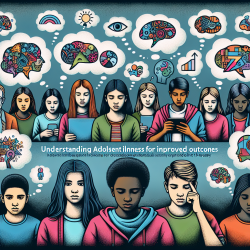Introduction
In the realm of speech-language pathology and mental health, understanding the perceptions of illness among adolescents is crucial. The study titled "Illness perceptions in adolescents with a psychiatric diagnosis in Pakistan" provides valuable insights into how cultural and demographic factors influence these perceptions. This blog aims to help practitioners improve their skills by implementing the research outcomes and encourages further research in this field.
Key Findings from the Research
The study involved 52 adolescents with various psychiatric diagnoses, revealing that:
- The majority perceived their illnesses as chronic and cyclical.
- Males showed stronger beliefs about the chronicity of their illness and emotional representation, such as anger and worry.
- Adolescents believed that psychological factors like stress and family problems contributed to their mental health issues.
- There was a general perception of having some personal control over their illness and a positive belief in the role of treatment.
Implications for Practitioners
These findings have significant implications for practitioners working with adolescents, especially in culturally diverse settings:
- Cultural Sensitivity: Understanding cultural beliefs and perceptions is essential for developing effective interventions. Practitioners should consider cultural factors when designing treatment plans.
- Engagement Strategies: The study highlights the need for culturally sensitive engagement strategies to improve the utilization of mental health services among adolescents.
- Gender-Specific Approaches: The observed gender differences suggest that practitioners should tailor their approaches to address the unique needs and perceptions of male and female adolescents.
Encouraging Further Research
While this study provides valuable insights, it also highlights the need for further research. Practitioners are encouraged to explore the following areas:
- Broader Demographic Studies: Conducting studies with larger and more diverse samples can provide a more comprehensive understanding of adolescent illness perceptions.
- Qualitative Research: In-depth interviews and qualitative studies can offer deeper insights into the personal experiences and perceptions of adolescents.
- Intervention Efficacy: Researching the effectiveness of culturally tailored interventions can help refine treatment approaches and improve outcomes.
Conclusion
Understanding how adolescents perceive their psychiatric illnesses is crucial for developing effective, culturally sensitive interventions. By integrating these insights into practice, practitioners can enhance engagement and improve outcomes for young people. For those interested in delving deeper into the research, the original study offers a comprehensive analysis of these issues.
To read the original research paper, please follow this link: Illness perceptions in adolescents with a psychiatric diagnosis in Pakistan.










